Unit 2 Keeping Healthy 期末复习课件(共24张PPT)
文档属性
| 名称 | Unit 2 Keeping Healthy 期末复习课件(共24张PPT) | 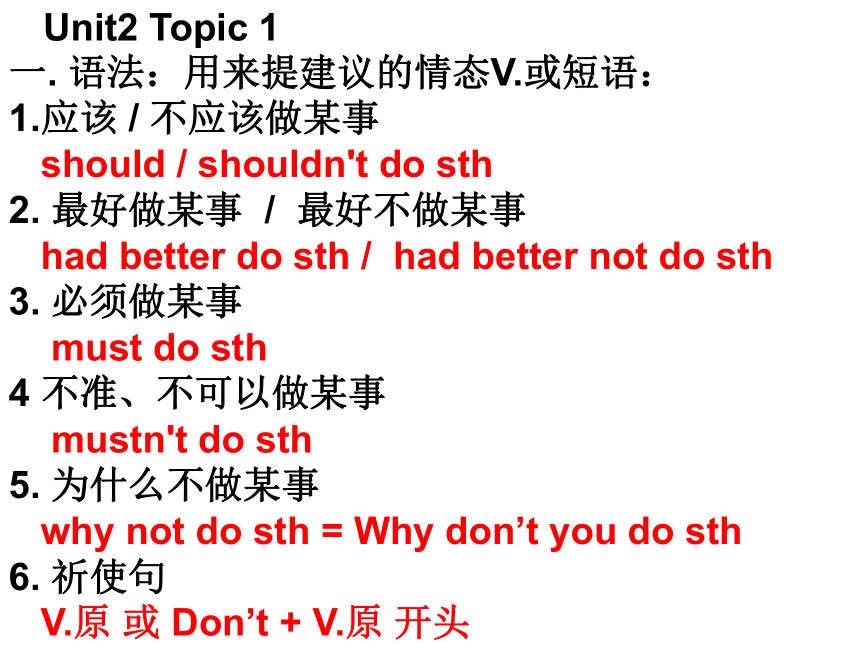 | |
| 格式 | zip | ||
| 文件大小 | 139.8KB | ||
| 资源类型 | 教案 | ||
| 版本资源 | 仁爱科普版 | ||
| 科目 | 英语 | ||
| 更新时间 | 2020-01-07 07:19:07 | ||
图片预览

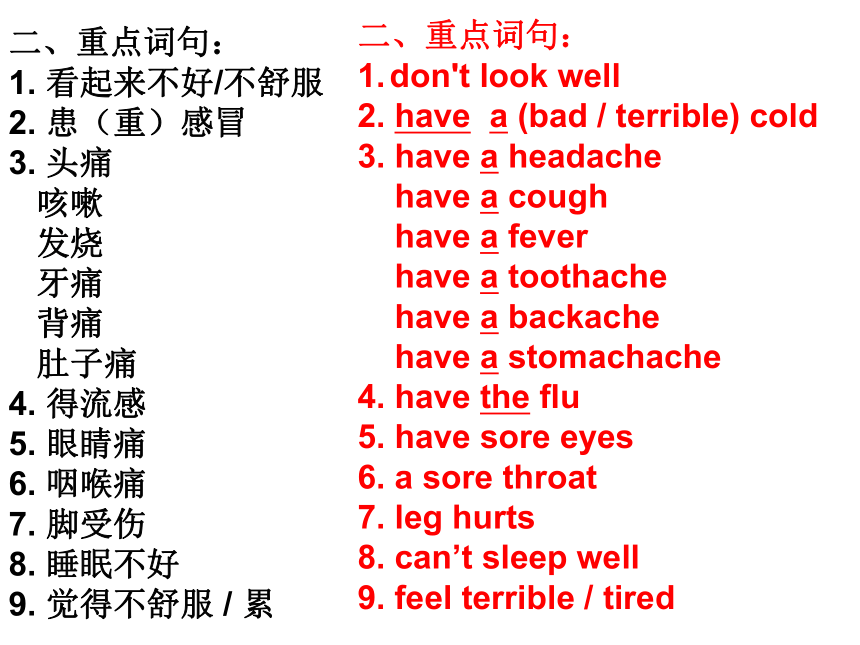
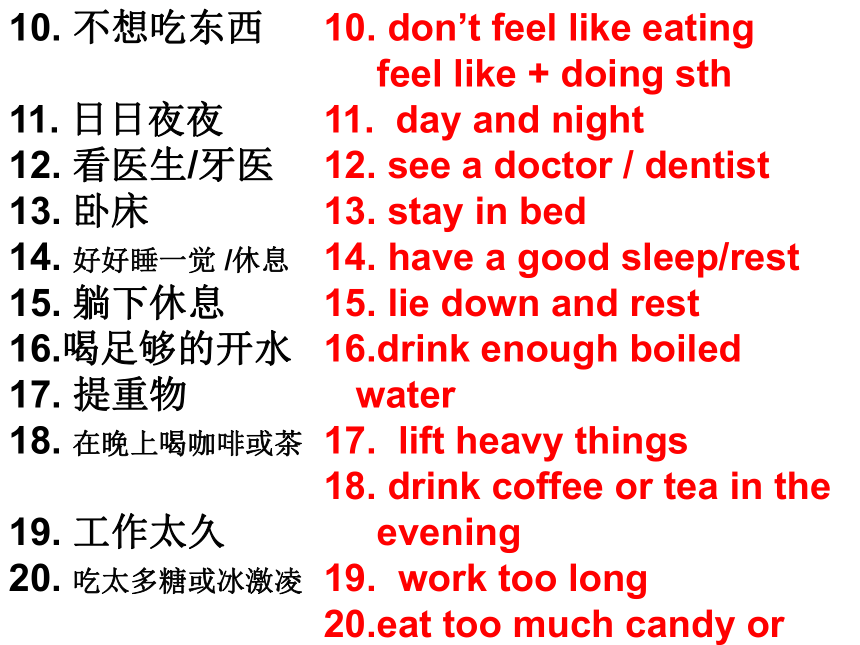
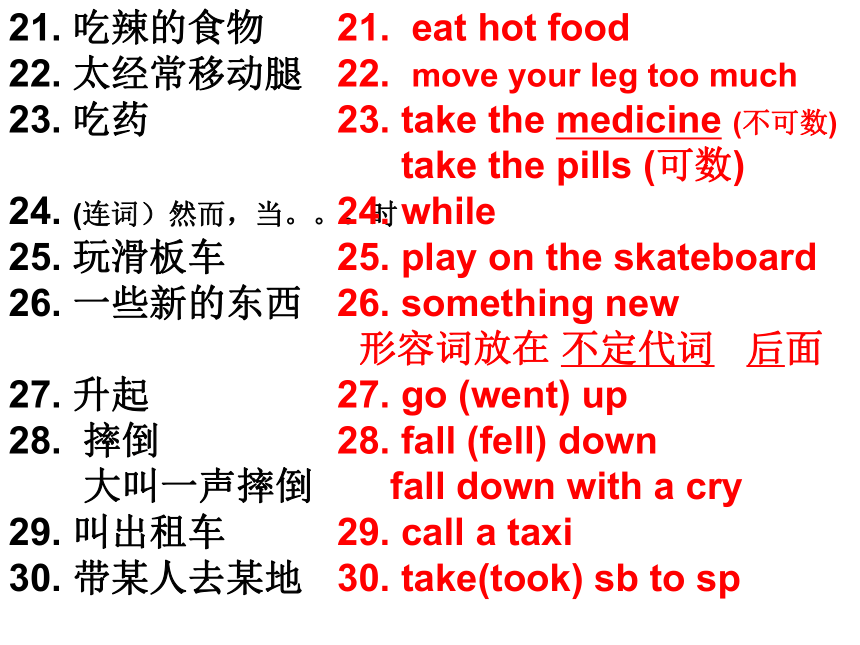
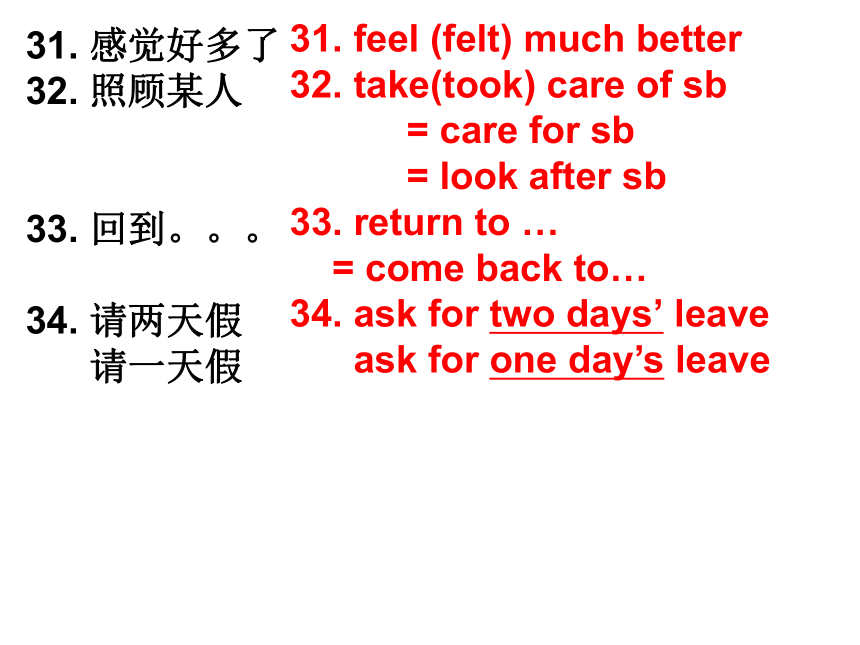
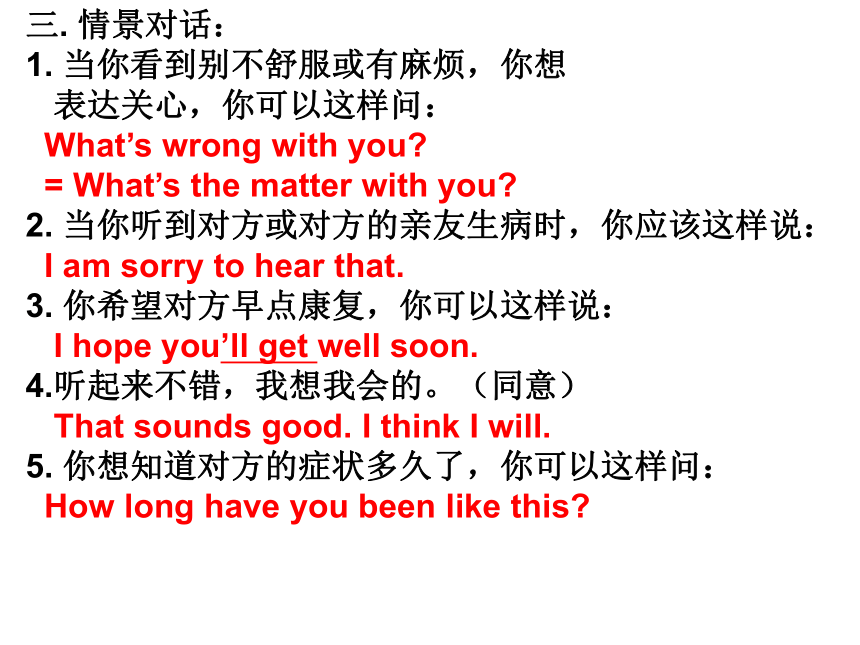
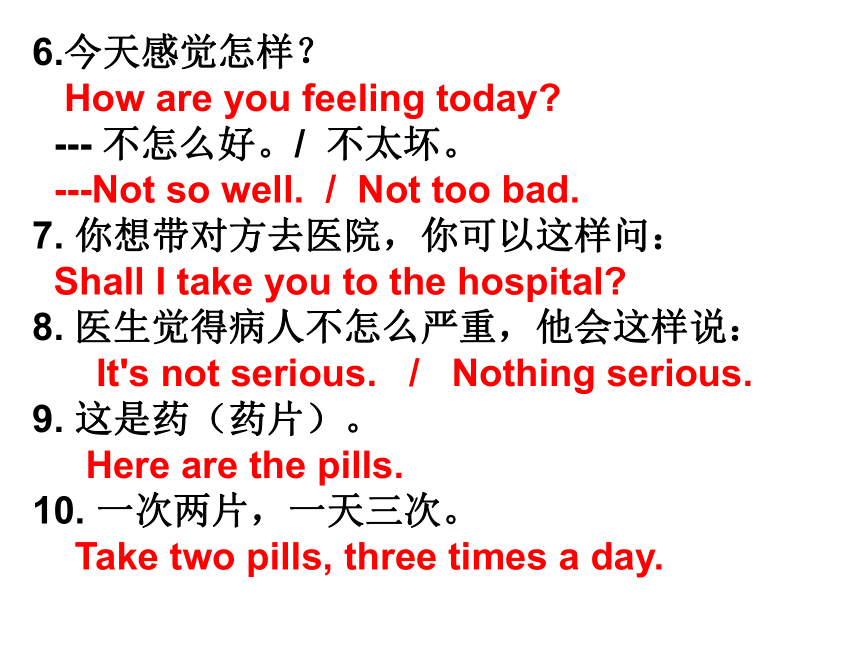
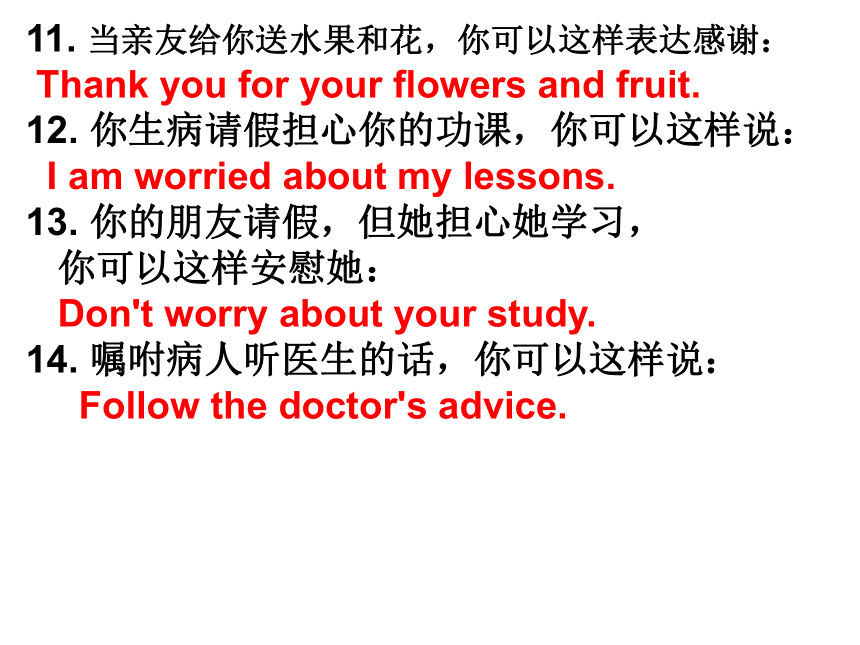
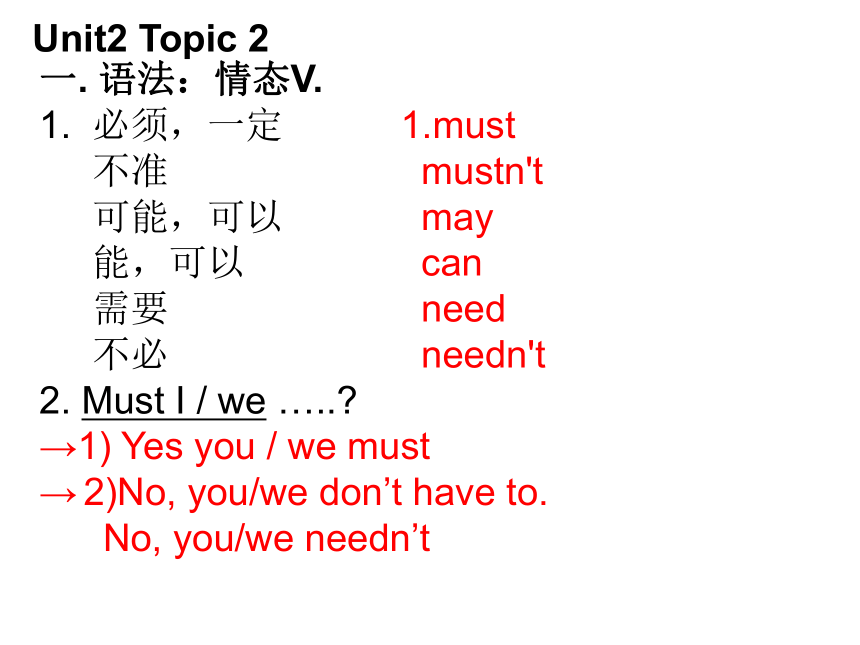
文档简介
(共24张PPT)
Unit2 Topic 1
一. 语法:用来提建议的情态V.或短语:
应该 / 不应该做某事
should / shouldn't do sth
2. 最好做某事 / 最好不做某事
had better do sth / had better not do sth
3. 必须做某事
must do sth
不准、不可以做某事
mustn't do sth
5. 为什么不做某事
why not do sth = Why don’t you do sth
6. 祈使句
V.原 或 Don’t + V.原 开头
二、重点词句:
1. 看起来不好/不舒服
2. 患(重)感冒
3. 头痛
咳嗽
发烧
牙痛
背痛
肚子痛
4. 得流感
5. 眼睛痛
6. 咽喉痛
7. 脚受伤
8. 睡眠不好
9. 觉得不舒服 / 累
二、重点词句:
don't look well
2. have a (bad / terrible) cold
3. have a headache
have a cough
have a fever
have a toothache
have a backache
have a stomachache
4. have the flu
5. have sore eyes
6. a sore throat
7. leg hurts
8. can’t sleep well
9. feel terrible / tired
10. 不想吃东西
11. 日日夜夜
12. 看医生/牙医
13. 卧床
14. 好好睡一觉 /休息
15. 躺下休息
16.喝足够的开水
17. 提重物
18. 在晚上喝咖啡或茶
19. 工作太久
20. 吃太多糖或冰激凌
10. don’t feel like eating
feel like + doing sth
11. day and night
12. see a doctor / dentist
13. stay in bed
14. have a good sleep/rest
15. lie down and rest
16.drink enough boiled water
17. lift heavy things
18. drink coffee or tea in the
evening
19. work too long
eat too much candy or
ice cream
21. 吃辣的食物
22. 太经常移动腿
23. 吃药
24. (连词)然而,当。。。时
25. 玩滑板车
26. 一些新的东西
27. 升起
28. 摔倒
大叫一声摔倒
29. 叫出租车
30. 带某人去某地
21. eat hot food
22. move your leg too much
23. take the medicine (不可数)
take the pills (可数)
24. while
25. play on the skateboard
26. something new
形容词放在 不定代词 后面
27. go (went) up
28. fall (fell) down
fall down with a cry
29. call a taxi
30. take(took) sb to sp
31. 感觉好多了
32. 照顾某人
33. 回到。。。
34. 请两天假
请一天假
31. feel (felt) much better
32. take(took) care of sb
= care for sb
= look after sb
33. return to …
= come back to…
34. ask for two days’ leave
ask for one day’s leave
三. 情景对话:
1. 当你看到别不舒服或有麻烦,你想
表达关心,你可以这样问:
What’s wrong with you?
= What’s the matter with you?
2. 当你听到对方或对方的亲友生病时,你应该这样说:
I am sorry to hear that.
3. 你希望对方早点康复,你可以这样说:
I hope you’ll get well soon.
4.听起来不错,我想我会的。(同意)
That sounds good. I think I will.
5. 你想知道对方的症状多久了,你可以这样问:
How long have you been like this?
6.今天感觉怎样?
How are you feeling today?
--- 不怎么好。/ 不太坏。
---Not so well. / Not too bad.
7. 你想带对方去医院,你可以这样问:
Shall I take you to the hospital?
8. 医生觉得病人不怎么严重,他会这样说:
It's not serious. / Nothing serious.
9. 这是药(药片)。
Here are the pills.
10. 一次两片,一天三次。
Take two pills, three times a day.
11. 当亲友给你送水果和花,你可以这样表达感谢:
Thank you for your flowers and fruit.
12. 你生病请假担心你的功课,你可以这样说:
I am worried about my lessons.
13. 你的朋友请假,但她担心她学习,
你可以这样安慰她:
Don't worry about your study.
14. 嘱咐病人听医生的话,你可以这样说:
Follow the doctor's advice.
Unit2 Topic 2
一. 语法:情态V.
1. 必须,一定
不准
可能,可以
能,可以
需要
不必
2. Must I / we …..?
→1) Yes you / we must
→ 2)No, you/we don’t have to.
No, you/we needn’t
must
mustn't
may
can
need
needn't
二.重点词组:
1. 对……有益/害
对……有/害
2. 好的习惯
1)早睡早起
2)做早操/眼保健操
3)饭前洗手
4) 一天刷两次牙
5) 喝充足的水
6)多吃水果蔬菜
少吃肉
7)吃合适的食物
8)把垃圾放进垃圾桶
二.重点词组:
1. be good for ……
be bad for......
2. good habits
1) go to bed early and get up early
2) do morning/eye exercises
3) wash hands before meals
4) brush teeth twice a day
5) drink enough water every day
6)eat more fruit and
vegetables and less meat
7)eat the right food
8) put litter into dustbin
4. 坏习惯
1) 晚睡晚起
2) 留长指甲
3) 饭后马上运动
4)没吃早饭上学
5) 在公众场所吐痰
6) 乱扔垃圾
7) 在太阳下看书
8) 饭后马上运动
5. 在报纸上读一篇文章
6. 叫某人做某事
叫某人不做某事
7. 放弃某事/物
放弃做某事
4. bad habits
1) go to bed late and get up late
2) keep fingernails long
3) play sports right after meals
4) go to school without breakfast
5) spit everywhere
6) throw litter around
7) read in the sun
8)play sports right after meals
5. read an article in the newspaper
6. ask sb to do sth
ask sb not to do sth
7. give up sth
give up doing sth
8. 把某物给某人看
9. 引起/导致某事
10. 多么糟糕啊!
11. 小心做某事
小心不要做某事
12. 例如 + 句子
13. 迫使某人做某事
14. 出发去某地
15.一。。。就。。。
16. 使某人做某事
17. 惊讶地做某事
18. 不仅。。。而且。。。
8. show sth to sb
9. cause sth
10. How terrible!
11. be careful to do sth
be careful not to do sth
12. for example
13. force sb to do sth
14. leave for sp
15. as soon as.....
16. make sb do sth
17. be surprised to do sth
18. not only....but(also)...
三.重点句:
1. _________(play) sports is good for our health.
★__________________作主语,谓语动词用单数。
1) 熬夜对我们的健康有害。
Staying up is bad for our health.
2)一天刷两次牙对健康有益。
Brushing teeth twice a day is good for health.
3)在阳光下看书对我们的眼睛有害。
Reading in the sun is bad for eyes.
4)多吃蔬菜有益健康。
Eating more vegetables is good for health.
1. It's necessary ____ us _____ (do) exercise often.
句型归纳:
It's + _____ + ____ sb + _______ sth
动名词(v.ing)
Playing
for
to do
adj.
for
to do
1) 努力学习对我们来说是很重要的。
It’s necessary for us to study hard.
2)他很难完成这项工作。
It’s difficult for him to finish the work.
3)阅读是很有趣的。
It’s interesting to read.
3. 吸烟对我们的健康有益还是有害?
Is smoking good or bad for health?
4. 许多学生认为吸烟能帮助他们放松
Many students think smoking can help them relax.
5. 吸烟甚至会引起癌症。
Smoking can even cause cancer.
6. 我必须叫他戒烟。
I must ask him to give up smoking.
7. 早餐给你一个早上的能量。
Breakfast gives you energy for the morning.
8. 走路对我们的健康是必要的。
Walking is necessary for our health.
9. 早睡早起会保持你帮白天有活力。
Going to bed early and getting up early can keep
you active in the day.
10. 每天喝足够的水。
Drink enough warter.
11. 小心不要吃太多盐和糖。
Be careful not to eat too much salt or sugar.
12. 牛奶是健康的饮料。
Milk is healthy drink.
13. 他惊讶的发现卷芯菜是美味的。
He is surprised to find that cabbage is delicious.
14. 我们应该多吃蔬菜水果来保持健康。
We should eat more vegetables and fruit to keep healthy.
15. 吸烟伤害的不仅是吸烟者,而且还有其他人。
Smoking harms not only smoker but other people.
16. 他不仅喜欢鱼,而且还喜欢肉。
He likes not only fish but meat.
17. 我有足够的时间。
I have enough time.
18. 这房间足够大。
The room is big enough.
★enough 放在名词_______,放在形容词或副词___
前或后
后
Unit2 Topic 3
一. 语法 1、情态V. must 必须= have to必须,不得不
▲比较1) have to 表示客观的需要
must 表示说话人主观上的看法
2) have to有人称、数、时态的变化:
has to / had to / will have to
must只有一种形式
3)否定结构dont' have to/needn’t表示“不必”
mustn't 表示"禁止,不准"
随堂练习:
1)My brother was very ill, so I____call the doctor
in the middle night.
2) He said that they _____ work hard.
3) He???____ stay at home because it rains heavily.
4) You don't have to tell him about it.
(译)你不必告诉他这件事。
5) You mustn't tell him about it.
(译)你不准告诉他这件事。
6) --- Must I leave here now?
--- No, you _____ .
A. mustn’t B. don’t have to
C. needn’t D. B or C
语法2:反身代词
1. I--- __________ we --- ______________
you--- _________ you--- ______________
he --- _________
she --- _________ they--- ______________
it--- ________
D
myself
ourselves
yourself
yourselves
himself
themselves
herself
itself
2. 含反身代词的常用短语:
1)随意吃(某物)
2)对。。。入迷 沉迷于。。。
3)玩得愉快
4)自己做某事
5)自学
6)伤到自己
help oneself (to sth)
lose oneself in…
enjoy oneself
do sth. by oneself
teach oneself sth
=learn sth by oneself
hurt oneself
随堂练习:
1) The boys enjoyed ___________ in Beijing last year.
2) He taught _________ English when he was young.
3) The box is too heavy. She can’t carry it_________.
4) I _________ mended(修理) my bike.
5) We bought some fruit for ___________.
6) Please help ___________, kids.
7) Help __________ to some fish, Tom.
8) Mrs. Li asked Tom to help ___________.
9) The door opened ____________.
10) Don’t play with a knife. You may hurt _________.
11) The foreigners lost __________ in the beauty of
nature.
themselves.
himself
herself
myself
ourselves
yourselves
yourself
himself
itself
yourself
themselves
二.重点词句:
1. 增强某人体质
2.保持房间干净
3. 保持空气新鲜
4. 换衣服
5. 远离某事/某物
6. 拥挤的人群
7. 接受某人的建议
8. 感冒药
9. 在英特网上工作
10. 恐怕。。。
11. 现在
二.重点词句:
1. build sb up
2.keep the room clean
3. keep the air fresh
4. change clothes
5. keep / stay away from sth
6. crowded places
7. take one's advice
8. cold pills
9. work on the Internet
10. be afraid that +从句
11. right now
12. 打电话给某人
13. 半个小时之后
14. 留口信
15. 捎口信
16. 给某人口信
17. 告诉某人做某事
告诉某人不要做某事.
18. 向某人求助
19. 健康的饮食习惯
20. 正确的食物
21. 保持安全
22. 急救
23. 另一方面
12. ring sb up = call sb
13. half an hour later
14. leave a message
15. take a message
16. give sb a message
17. tell sb to do sth
tell sb not to do sth
18. ask sb for help
19. healthy eating habits
20. the right food
21. stay safe
22. first aid
23. on the other hand
24. 向。。。说不
25. 做报告
26. 忘记做某事
27. 准时
24. say no to ….
25. give a talk
26. forget to do sth
27. on time
三.情景交际:
1. 你打电话找A先生,你这样说:
1)May I speak to Mr. A?
2) I’d like to speak to Mr. A
2. 对不起,他不在。
Sorry, he isn’t in.
对不起,他现在忙。
Sorry, he is busy now.
恐怕他现在忙。
I’m afraid he is busy now.
3.你想留口信,你这样说:
Can I leave a message?
4. 你想让对方留口信,你这样说:
1) Can you leave a message?
2) Can I take a message ?
5. 你希望对方准时,你这样说:
Please be on time.
Unit2 Topic 1
一. 语法:用来提建议的情态V.或短语:
应该 / 不应该做某事
should / shouldn't do sth
2. 最好做某事 / 最好不做某事
had better do sth / had better not do sth
3. 必须做某事
must do sth
不准、不可以做某事
mustn't do sth
5. 为什么不做某事
why not do sth = Why don’t you do sth
6. 祈使句
V.原 或 Don’t + V.原 开头
二、重点词句:
1. 看起来不好/不舒服
2. 患(重)感冒
3. 头痛
咳嗽
发烧
牙痛
背痛
肚子痛
4. 得流感
5. 眼睛痛
6. 咽喉痛
7. 脚受伤
8. 睡眠不好
9. 觉得不舒服 / 累
二、重点词句:
don't look well
2. have a (bad / terrible) cold
3. have a headache
have a cough
have a fever
have a toothache
have a backache
have a stomachache
4. have the flu
5. have sore eyes
6. a sore throat
7. leg hurts
8. can’t sleep well
9. feel terrible / tired
10. 不想吃东西
11. 日日夜夜
12. 看医生/牙医
13. 卧床
14. 好好睡一觉 /休息
15. 躺下休息
16.喝足够的开水
17. 提重物
18. 在晚上喝咖啡或茶
19. 工作太久
20. 吃太多糖或冰激凌
10. don’t feel like eating
feel like + doing sth
11. day and night
12. see a doctor / dentist
13. stay in bed
14. have a good sleep/rest
15. lie down and rest
16.drink enough boiled water
17. lift heavy things
18. drink coffee or tea in the
evening
19. work too long
eat too much candy or
ice cream
21. 吃辣的食物
22. 太经常移动腿
23. 吃药
24. (连词)然而,当。。。时
25. 玩滑板车
26. 一些新的东西
27. 升起
28. 摔倒
大叫一声摔倒
29. 叫出租车
30. 带某人去某地
21. eat hot food
22. move your leg too much
23. take the medicine (不可数)
take the pills (可数)
24. while
25. play on the skateboard
26. something new
形容词放在 不定代词 后面
27. go (went) up
28. fall (fell) down
fall down with a cry
29. call a taxi
30. take(took) sb to sp
31. 感觉好多了
32. 照顾某人
33. 回到。。。
34. 请两天假
请一天假
31. feel (felt) much better
32. take(took) care of sb
= care for sb
= look after sb
33. return to …
= come back to…
34. ask for two days’ leave
ask for one day’s leave
三. 情景对话:
1. 当你看到别不舒服或有麻烦,你想
表达关心,你可以这样问:
What’s wrong with you?
= What’s the matter with you?
2. 当你听到对方或对方的亲友生病时,你应该这样说:
I am sorry to hear that.
3. 你希望对方早点康复,你可以这样说:
I hope you’ll get well soon.
4.听起来不错,我想我会的。(同意)
That sounds good. I think I will.
5. 你想知道对方的症状多久了,你可以这样问:
How long have you been like this?
6.今天感觉怎样?
How are you feeling today?
--- 不怎么好。/ 不太坏。
---Not so well. / Not too bad.
7. 你想带对方去医院,你可以这样问:
Shall I take you to the hospital?
8. 医生觉得病人不怎么严重,他会这样说:
It's not serious. / Nothing serious.
9. 这是药(药片)。
Here are the pills.
10. 一次两片,一天三次。
Take two pills, three times a day.
11. 当亲友给你送水果和花,你可以这样表达感谢:
Thank you for your flowers and fruit.
12. 你生病请假担心你的功课,你可以这样说:
I am worried about my lessons.
13. 你的朋友请假,但她担心她学习,
你可以这样安慰她:
Don't worry about your study.
14. 嘱咐病人听医生的话,你可以这样说:
Follow the doctor's advice.
Unit2 Topic 2
一. 语法:情态V.
1. 必须,一定
不准
可能,可以
能,可以
需要
不必
2. Must I / we …..?
→1) Yes you / we must
→ 2)No, you/we don’t have to.
No, you/we needn’t
must
mustn't
may
can
need
needn't
二.重点词组:
1. 对……有益/害
对……有/害
2. 好的习惯
1)早睡早起
2)做早操/眼保健操
3)饭前洗手
4) 一天刷两次牙
5) 喝充足的水
6)多吃水果蔬菜
少吃肉
7)吃合适的食物
8)把垃圾放进垃圾桶
二.重点词组:
1. be good for ……
be bad for......
2. good habits
1) go to bed early and get up early
2) do morning/eye exercises
3) wash hands before meals
4) brush teeth twice a day
5) drink enough water every day
6)eat more fruit and
vegetables and less meat
7)eat the right food
8) put litter into dustbin
4. 坏习惯
1) 晚睡晚起
2) 留长指甲
3) 饭后马上运动
4)没吃早饭上学
5) 在公众场所吐痰
6) 乱扔垃圾
7) 在太阳下看书
8) 饭后马上运动
5. 在报纸上读一篇文章
6. 叫某人做某事
叫某人不做某事
7. 放弃某事/物
放弃做某事
4. bad habits
1) go to bed late and get up late
2) keep fingernails long
3) play sports right after meals
4) go to school without breakfast
5) spit everywhere
6) throw litter around
7) read in the sun
8)play sports right after meals
5. read an article in the newspaper
6. ask sb to do sth
ask sb not to do sth
7. give up sth
give up doing sth
8. 把某物给某人看
9. 引起/导致某事
10. 多么糟糕啊!
11. 小心做某事
小心不要做某事
12. 例如 + 句子
13. 迫使某人做某事
14. 出发去某地
15.一。。。就。。。
16. 使某人做某事
17. 惊讶地做某事
18. 不仅。。。而且。。。
8. show sth to sb
9. cause sth
10. How terrible!
11. be careful to do sth
be careful not to do sth
12. for example
13. force sb to do sth
14. leave for sp
15. as soon as.....
16. make sb do sth
17. be surprised to do sth
18. not only....but(also)...
三.重点句:
1. _________(play) sports is good for our health.
★__________________作主语,谓语动词用单数。
1) 熬夜对我们的健康有害。
Staying up is bad for our health.
2)一天刷两次牙对健康有益。
Brushing teeth twice a day is good for health.
3)在阳光下看书对我们的眼睛有害。
Reading in the sun is bad for eyes.
4)多吃蔬菜有益健康。
Eating more vegetables is good for health.
1. It's necessary ____ us _____ (do) exercise often.
句型归纳:
It's + _____ + ____ sb + _______ sth
动名词(v.ing)
Playing
for
to do
adj.
for
to do
1) 努力学习对我们来说是很重要的。
It’s necessary for us to study hard.
2)他很难完成这项工作。
It’s difficult for him to finish the work.
3)阅读是很有趣的。
It’s interesting to read.
3. 吸烟对我们的健康有益还是有害?
Is smoking good or bad for health?
4. 许多学生认为吸烟能帮助他们放松
Many students think smoking can help them relax.
5. 吸烟甚至会引起癌症。
Smoking can even cause cancer.
6. 我必须叫他戒烟。
I must ask him to give up smoking.
7. 早餐给你一个早上的能量。
Breakfast gives you energy for the morning.
8. 走路对我们的健康是必要的。
Walking is necessary for our health.
9. 早睡早起会保持你帮白天有活力。
Going to bed early and getting up early can keep
you active in the day.
10. 每天喝足够的水。
Drink enough warter.
11. 小心不要吃太多盐和糖。
Be careful not to eat too much salt or sugar.
12. 牛奶是健康的饮料。
Milk is healthy drink.
13. 他惊讶的发现卷芯菜是美味的。
He is surprised to find that cabbage is delicious.
14. 我们应该多吃蔬菜水果来保持健康。
We should eat more vegetables and fruit to keep healthy.
15. 吸烟伤害的不仅是吸烟者,而且还有其他人。
Smoking harms not only smoker but other people.
16. 他不仅喜欢鱼,而且还喜欢肉。
He likes not only fish but meat.
17. 我有足够的时间。
I have enough time.
18. 这房间足够大。
The room is big enough.
★enough 放在名词_______,放在形容词或副词___
前或后
后
Unit2 Topic 3
一. 语法 1、情态V. must 必须= have to必须,不得不
▲比较1) have to 表示客观的需要
must 表示说话人主观上的看法
2) have to有人称、数、时态的变化:
has to / had to / will have to
must只有一种形式
3)否定结构dont' have to/needn’t表示“不必”
mustn't 表示"禁止,不准"
随堂练习:
1)My brother was very ill, so I____call the doctor
in the middle night.
2) He said that they _____ work hard.
3) He???____ stay at home because it rains heavily.
4) You don't have to tell him about it.
(译)你不必告诉他这件事。
5) You mustn't tell him about it.
(译)你不准告诉他这件事。
6) --- Must I leave here now?
--- No, you _____ .
A. mustn’t B. don’t have to
C. needn’t D. B or C
语法2:反身代词
1. I--- __________ we --- ______________
you--- _________ you--- ______________
he --- _________
she --- _________ they--- ______________
it--- ________
D
myself
ourselves
yourself
yourselves
himself
themselves
herself
itself
2. 含反身代词的常用短语:
1)随意吃(某物)
2)对。。。入迷 沉迷于。。。
3)玩得愉快
4)自己做某事
5)自学
6)伤到自己
help oneself (to sth)
lose oneself in…
enjoy oneself
do sth. by oneself
teach oneself sth
=learn sth by oneself
hurt oneself
随堂练习:
1) The boys enjoyed ___________ in Beijing last year.
2) He taught _________ English when he was young.
3) The box is too heavy. She can’t carry it_________.
4) I _________ mended(修理) my bike.
5) We bought some fruit for ___________.
6) Please help ___________, kids.
7) Help __________ to some fish, Tom.
8) Mrs. Li asked Tom to help ___________.
9) The door opened ____________.
10) Don’t play with a knife. You may hurt _________.
11) The foreigners lost __________ in the beauty of
nature.
themselves.
himself
herself
myself
ourselves
yourselves
yourself
himself
itself
yourself
themselves
二.重点词句:
1. 增强某人体质
2.保持房间干净
3. 保持空气新鲜
4. 换衣服
5. 远离某事/某物
6. 拥挤的人群
7. 接受某人的建议
8. 感冒药
9. 在英特网上工作
10. 恐怕。。。
11. 现在
二.重点词句:
1. build sb up
2.keep the room clean
3. keep the air fresh
4. change clothes
5. keep / stay away from sth
6. crowded places
7. take one's advice
8. cold pills
9. work on the Internet
10. be afraid that +从句
11. right now
12. 打电话给某人
13. 半个小时之后
14. 留口信
15. 捎口信
16. 给某人口信
17. 告诉某人做某事
告诉某人不要做某事.
18. 向某人求助
19. 健康的饮食习惯
20. 正确的食物
21. 保持安全
22. 急救
23. 另一方面
12. ring sb up = call sb
13. half an hour later
14. leave a message
15. take a message
16. give sb a message
17. tell sb to do sth
tell sb not to do sth
18. ask sb for help
19. healthy eating habits
20. the right food
21. stay safe
22. first aid
23. on the other hand
24. 向。。。说不
25. 做报告
26. 忘记做某事
27. 准时
24. say no to ….
25. give a talk
26. forget to do sth
27. on time
三.情景交际:
1. 你打电话找A先生,你这样说:
1)May I speak to Mr. A?
2) I’d like to speak to Mr. A
2. 对不起,他不在。
Sorry, he isn’t in.
对不起,他现在忙。
Sorry, he is busy now.
恐怕他现在忙。
I’m afraid he is busy now.
3.你想留口信,你这样说:
Can I leave a message?
4. 你想让对方留口信,你这样说:
1) Can you leave a message?
2) Can I take a message ?
5. 你希望对方准时,你这样说:
Please be on time.
同课章节目录
- Unit 1 Playing Sports
- Topic 1 I'm going to play basketball.
- Topic 2 I'll kick you the ball again.
- Topic 3 The school sports meet is coming.
- Unit 2 Keeping Healthy
- Topic 1 You should brush your teeth twice a day.
- Topic 2 I must ask him to give up smoking.
- Topic 3 Must we exercise to prevent the flu?
- Unit 3 Our Hobbies
- Topic 1 What's your hobby?
- Topic 2 What sweet music!
- Topic 3 What were you doing at this time yesterday
- Unit 4 Our World
- Topic 1 What's the strongest animal on the farm?
- Topic 2 How can we protect ourselves from the eart
- Topic 3 The Internet makes the world smaller.
